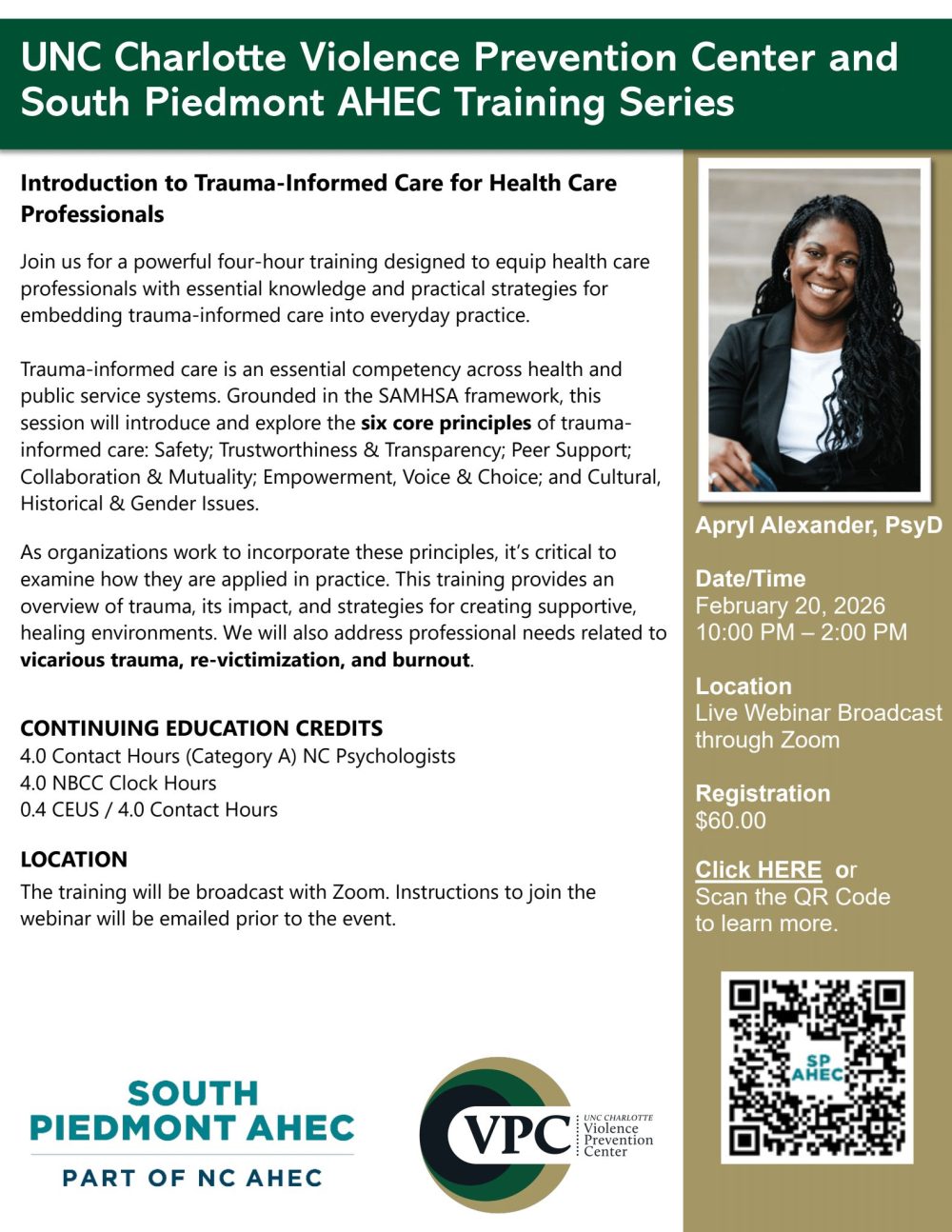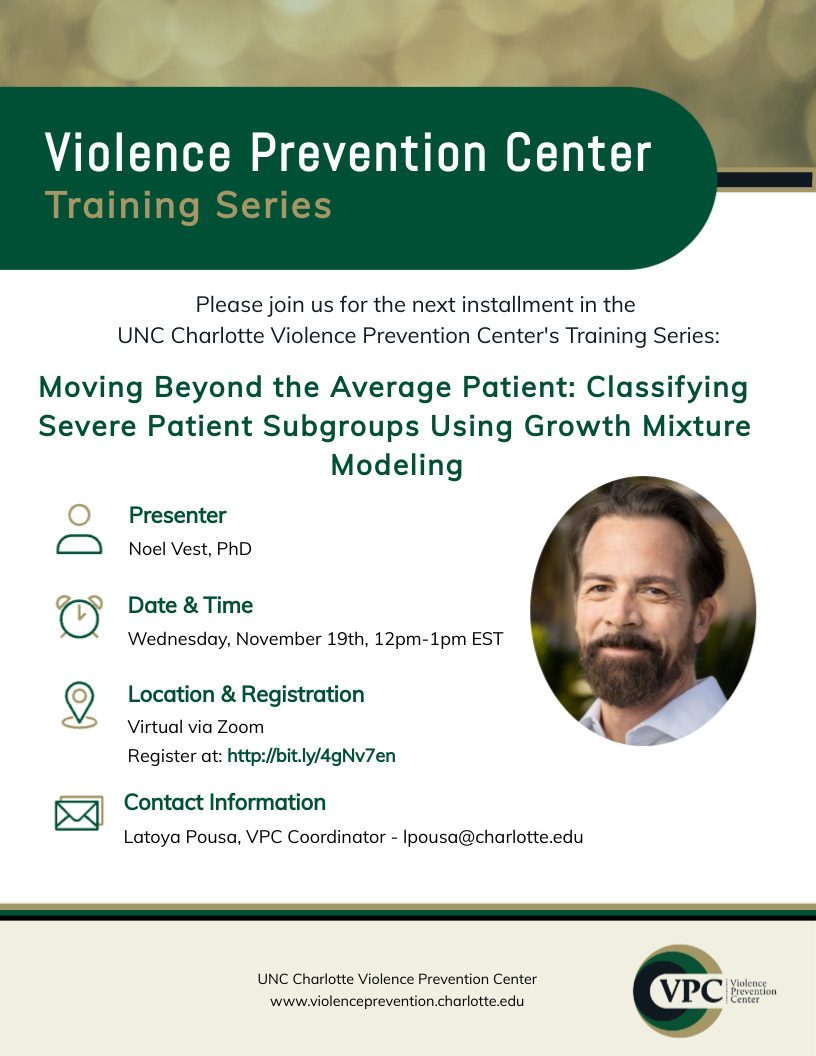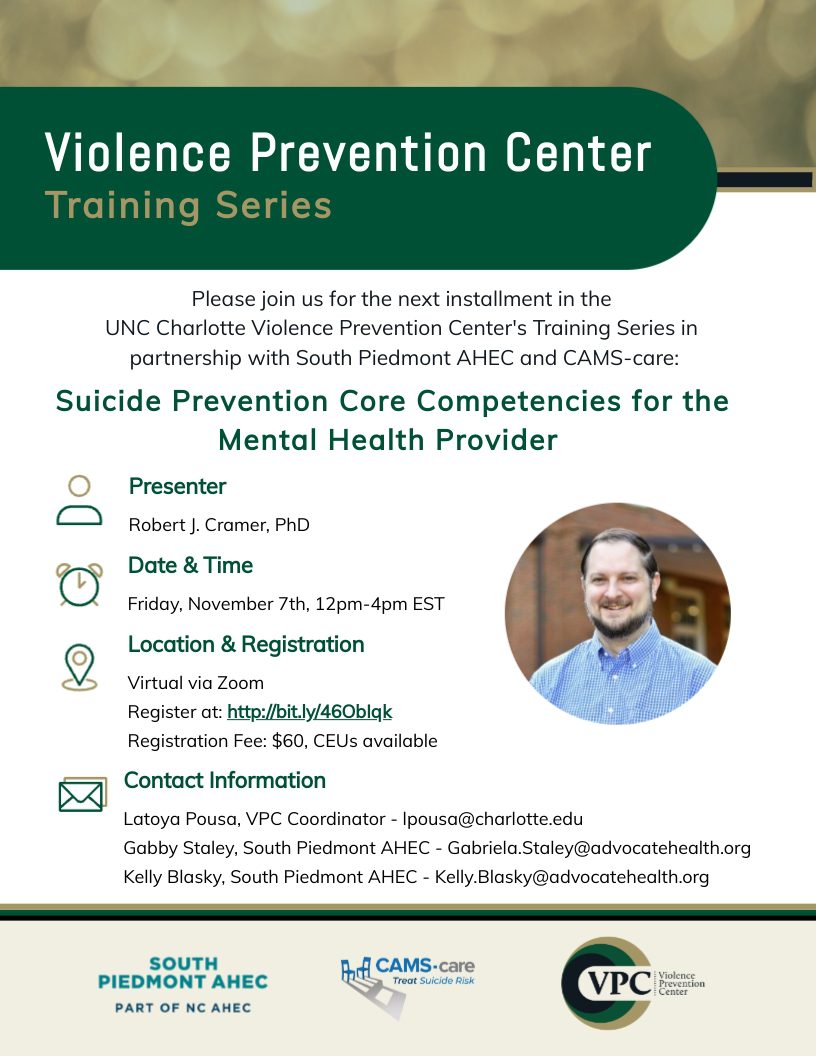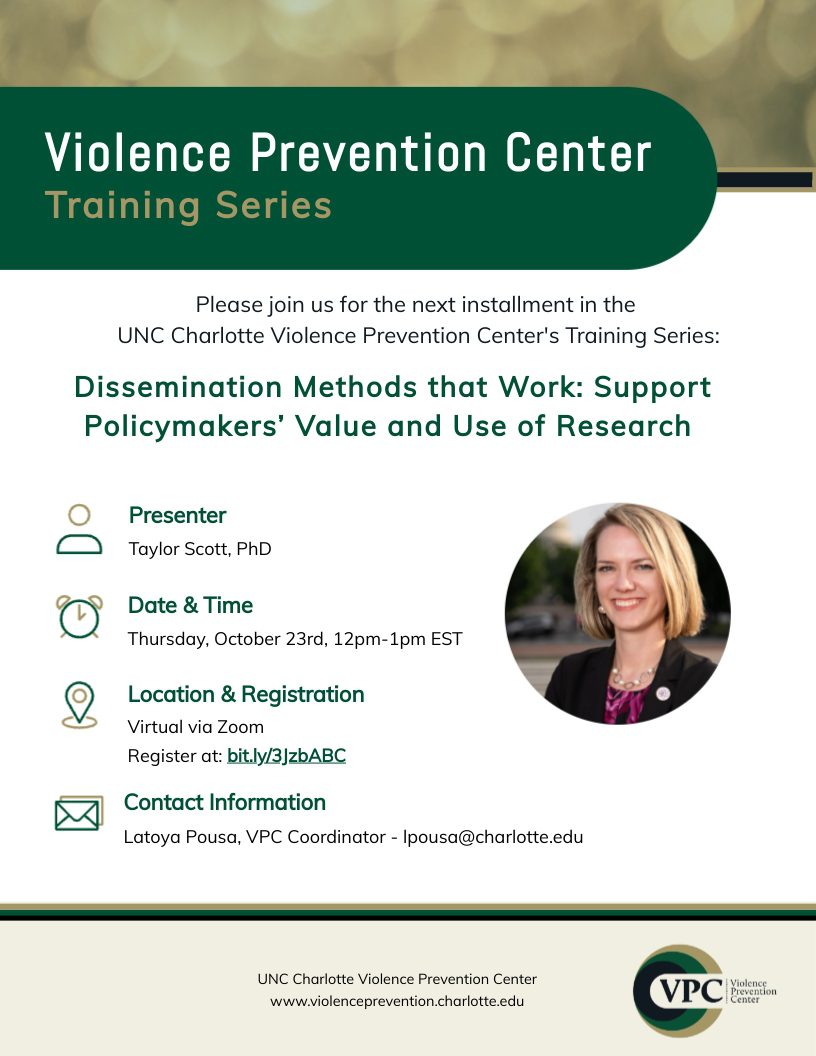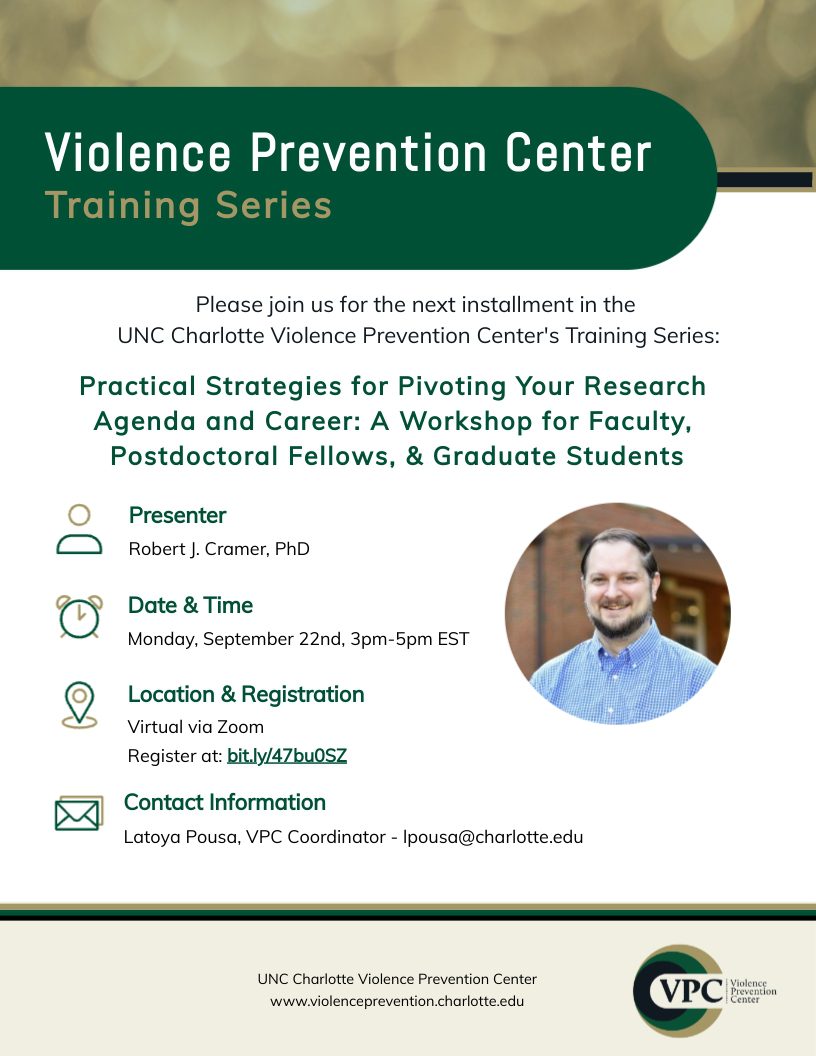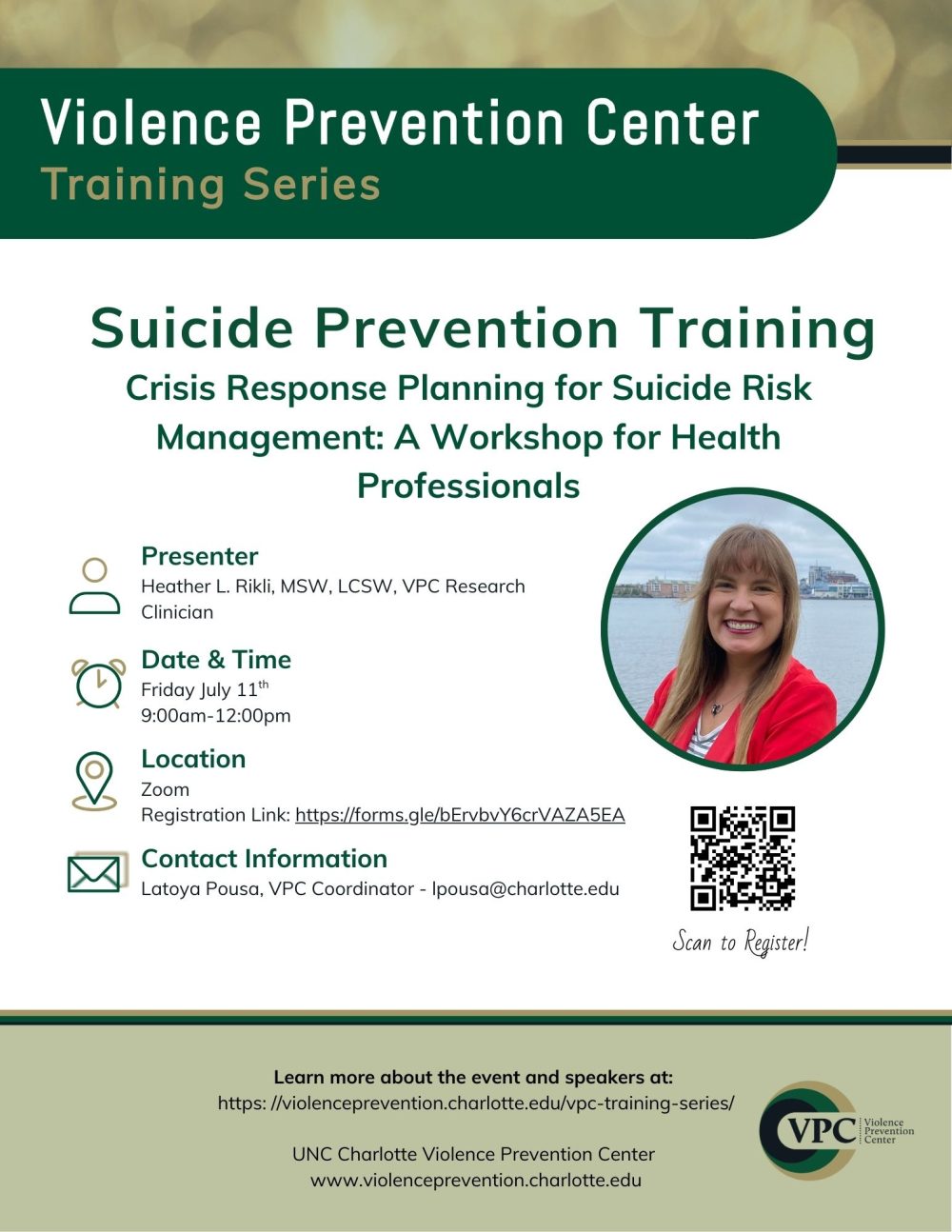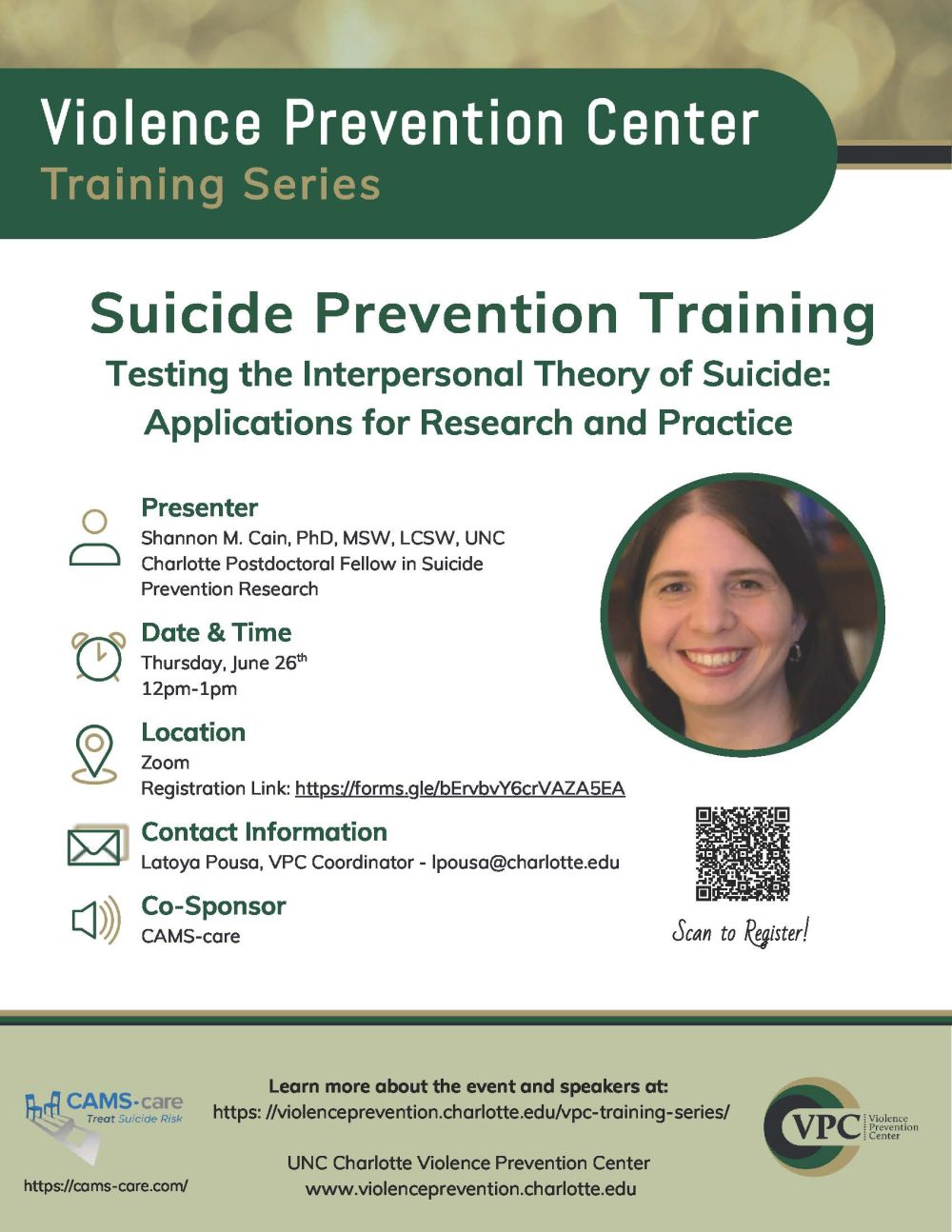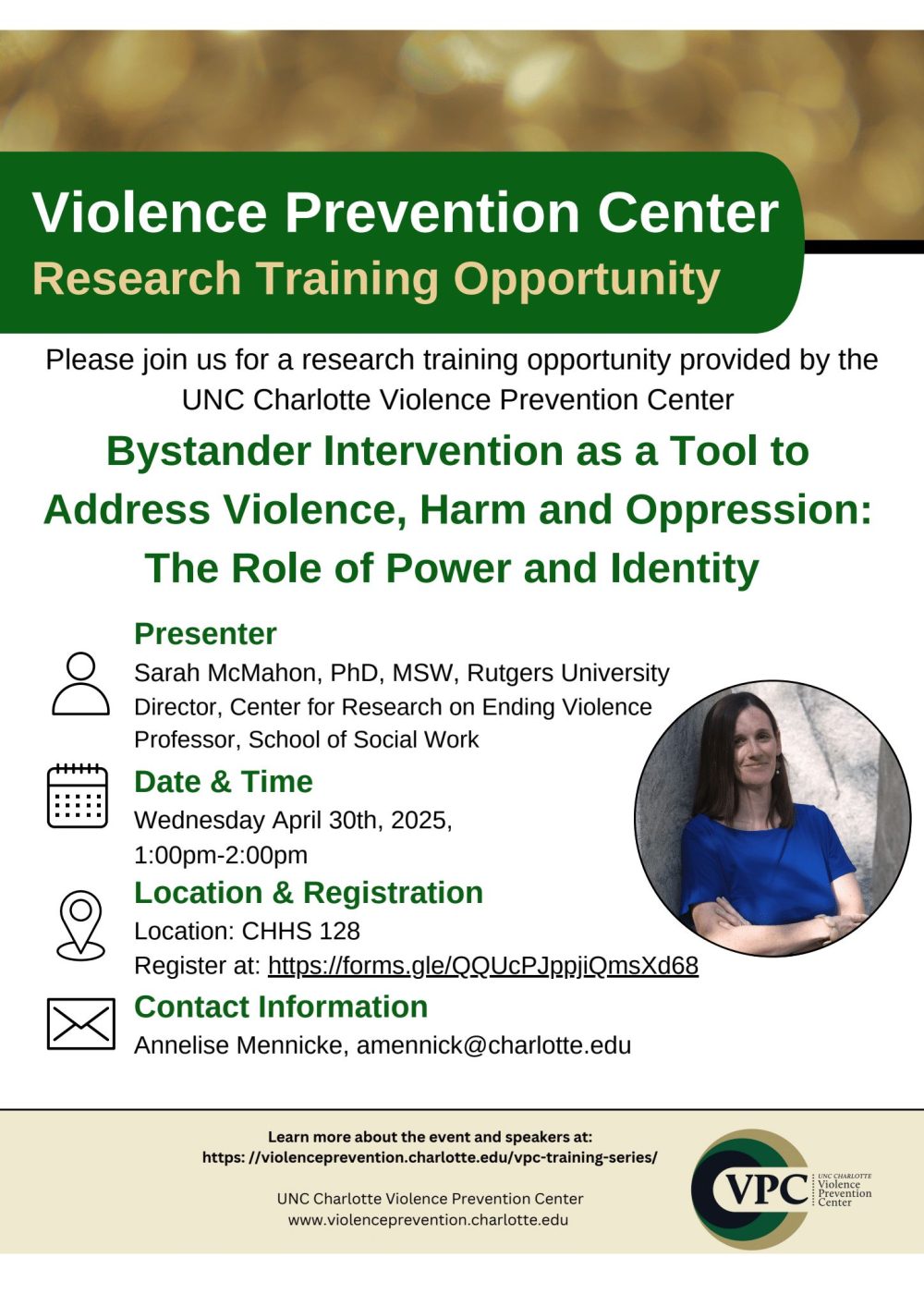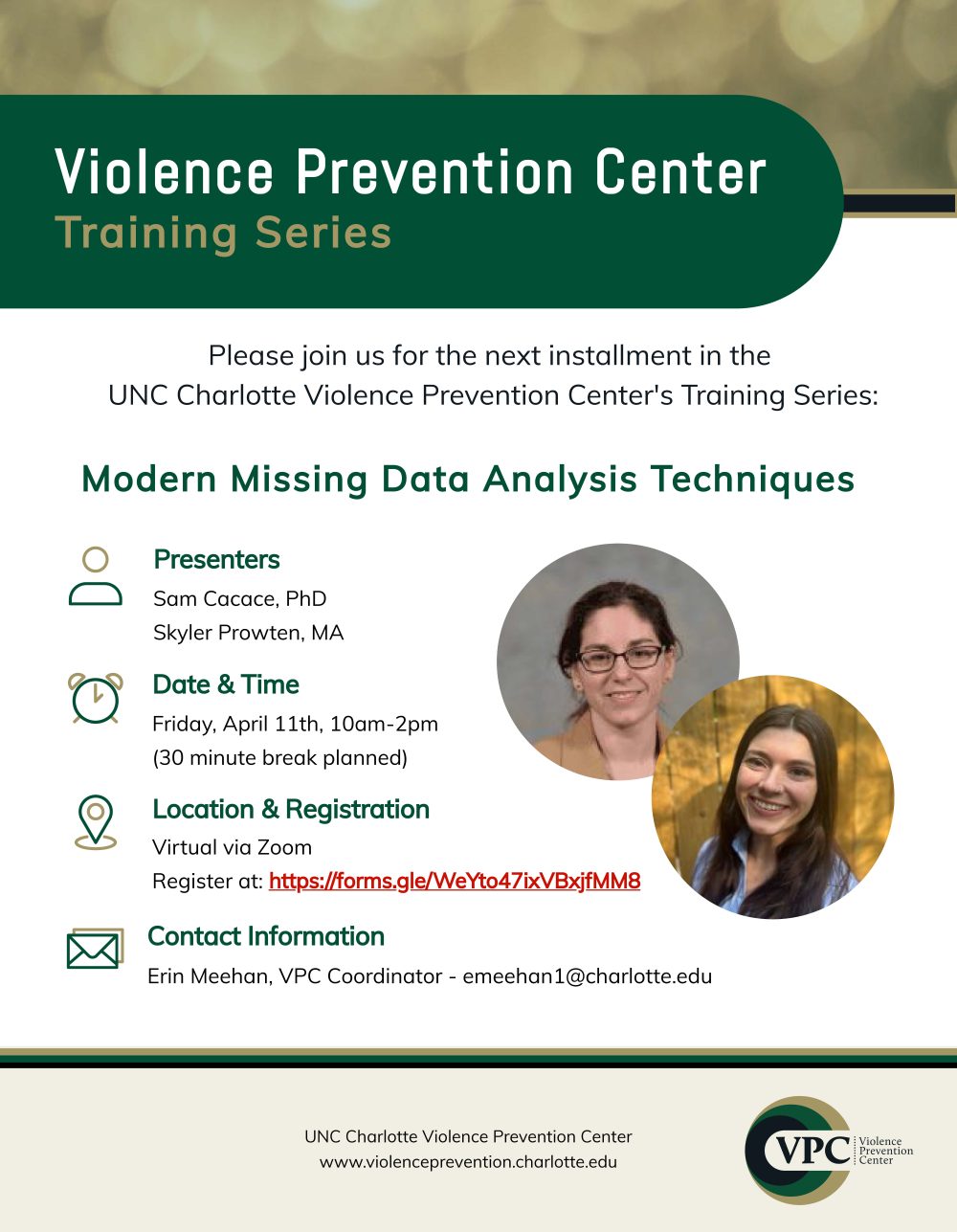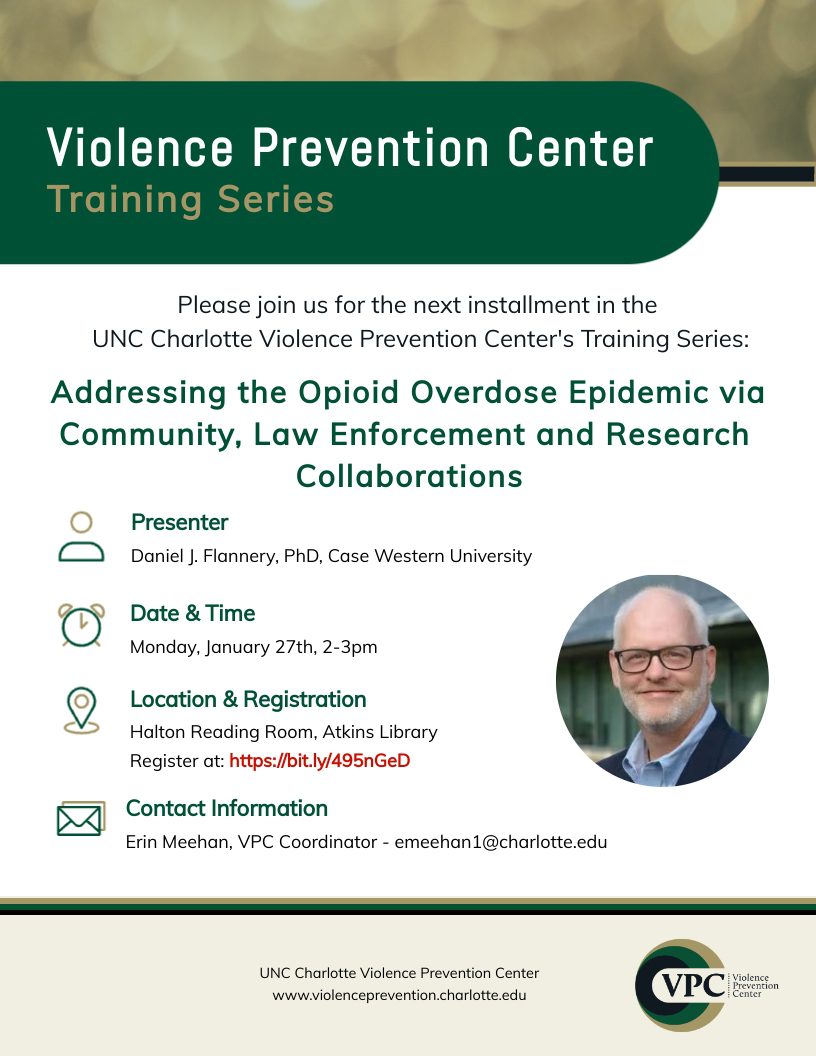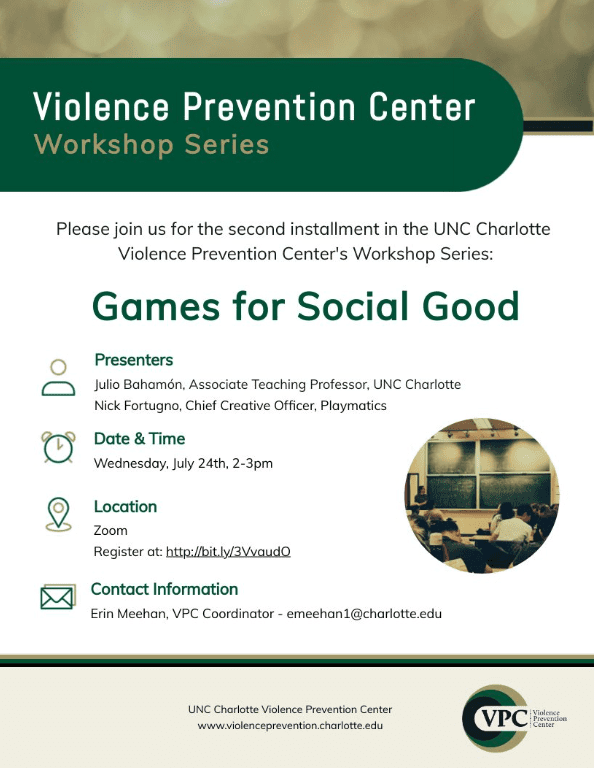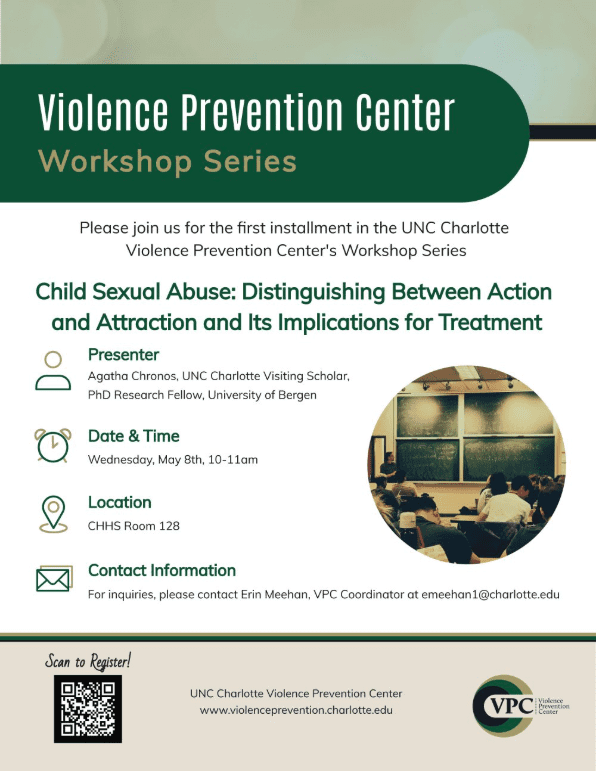VPC Training Series
At the VPC, we are committed to fostering a culture of learning and growth. Our VPC Training Series offers a variety of specialized trainings for students, staff, faculty, health practitioners, community members, and organizations—both governmental and non-governmental. Whether you’re looking to deepen your expertise or eager to share it, we have opportunities designed just for you.
UPCOMING TRAININGS
Stay informed about upcoming sessions! Each training is carefully crafted to address timely topics and to equip participants with practical, research-backed strategies for violence prevention. Check back here regularly to register for new sessions.
The Spring 2026 Training Series is offered through a regional partnership between the UNC Charlotte Violence Prevention Center and the South Piedmont Area Health Education Center. Each training will be held virtually, and a link will be shared upon registration. Trainings will not be recorded unless otherwise noted in the event description. All sessions offer continuing education credits.
Introduction to Trauma-Informed Care for Health Care Professionals
Date: February 20, 2026
Time: 10:00 AM – 2:00 PM
Location: Zoom
Cost: $60
Credits: 4 CEs
In this half-day webinar, Dr. Alexander addresses trauma-informed care to equip participants with the foundational skills to increase the implementation of trauma-informed practices in their workplace environments.
Trauma-informed care is increasingly recognized as a critical competency across health and public systems, with growing demand for professionals who can foster trauma-informed environments. Grounded in the Substance Abuse and Mental Health Services Administration (SAMHSA) framework, the session will explore the six key principles of trauma-informed care: Safety; Trustworthiness and Transparency; Peer Support; Collaboration and Mutuality; Empowerment, Voice, and Choice; and Cultural, Historical, and Gender Issues. As various systems strive to incorporate trauma-informed care principles into practice, it is important to examine how they are being implemented. While many institutions and organizations have worked to educate staff and administration on trauma and its impact, conversations on institutional and structural changes needed to be trauma-informed warrant improvement. This four-hour webinar introduces the foundational concepts of trauma-informed care and guides attendees in recognizing trauma and fostering healing environments. Additionally, we will discuss professional needs regarding vicarious victimization, re-victimization, and burnout. The presentation will involve a didactic lecture, guided discussion questions, and time for Q&A.
Target Audience: Allied health professionals, healthcare providers, health professions students, college student personnel, victim advocates, mental health advocates, and researchers

About Dr. Apryl Alexander
Dr. Apryl Alexander is the Metrolina Distinguished Professor of Health & Policy in the Department of Health Management and Policy at UNC Charlotte. She also serves as Director of the UNC Charlotte Violence Prevention Center. She received her doctorate in clinical psychology from the Florida Institute of Technology with concentrations in forensic psychology and child and family therapy. Dr. Alexander’s research and clinical work focus on violence, interpersonal trauma, human sexuality, and trauma-informed and culturally responsive practice. Her work has been published in several leading journals, including Child Maltreatment and Sexual Abuse. She is also a Fellow of the American Psychological Association (APA) and the Association for the Treatment and Prevention of Sexual Abuse (ATSA).
Ethical Considerations in Providing Affirming Care for LGBTQIA+ Clients
Date: March 3, 2026
Time: 12:00 PM – 1:00 PM
Location: Zoom
Cost: $15
Credits: 1 CE
In this one-hour webinar, Dr. Bate addresses fostering and upholding best practices in caring for, and working with, LGBTQIA+ folks. This training goes beyond a “101” and will invite you to dig deeper in recognizing the way language (including our everyday language) can impact the safety and mental health of LGBTQIA+ folks.
This presentation, facilitated by Dr. Brittany Bate (she) of Be BOLD Psychology and Consulting, will discuss research-informed best practices in treatment and assessment of LGBTQIA+ clients, including taking a more critical look at the diagnosis of Gender Dysphoria. We will discuss a history of discrimination experienced by LGBTQIA+ clients, harm caused within mental health and medical facilities, as well as mental health, medical, and substance-use–related risk factors for the queer+ community. We will examine gender identity, gender expression, pronoun use/practice, gender “blind spots” and the social construction of gender, best practices in utilizing affirming language, and offering resources for additional learning and education. Participants will be able to think more thoughtfully regarding diverse experiences of gender and sexual orientation and will better understand how to create safer and more affirming spaces for LGBTQIA+ clients.
Target Audience: Any medical, mental health, wellness professional, administrative professional, staff member, law enforcement officer, or childcare worker who may come in contact with or supports LGBTQIA+ clients

About Dr. Brittany Bate
Dr. Brittany Bate, Ph.D. (she) is a queer-identified psychologist, group practice owner, and consultant. Dr. Bate’s clinical practice, advocacy work, training, and consultation is centered upon improving access to culturally competent, affirming, inclusive care for queer+ community members, including transgender, nonbinary, and gender-diverse people. She has significant experience and training in providing gender-affirming care across a variety of settings and with diverse populations. She was also an active contributor in helping to author three statements based on psychological science. You can learn more about Dr. Bate’s mental health practice, Be BOLD Psychology and Consulting, by clicking the link below. Be BOLD provides LGBTQIA+ celebratory, neuroaffirming, and trauma-informed care to clients across NC, SC, VA, and the 43 PSYPACT states. https://beboldpsychnc.com
Meeting People Where They Are At: The Basics of Motivational Interview for Substance Use Treatment
Date: April 8, 2026
Time: 2:00 PM – 5:00 PM
Location: Zoom
Cost: $45
Credits: 3 CE
In this three-hour webinar, Dr. Ricciutti will address Motivational Interviewing (MI) skills which are highly relevant to many clinical and communication-focused professions. Individuals working in hospitals, non-profit agencies, private practices and academic settings can benefit from learning these skills to help people change.
Motivational Interviewing is an essential approach for treating individuals with substance use disorders or addiction. This goal-directed communication style emphasizes the language of change, helping clients resolve ambivalence, feel understood, and align their values and goals with personal choices. Despite its effectiveness, MI is often underutilized or applied incorrectly with those struggling with addiction.
This training will equip clinicians, future clinicians, and researchers with a deeper understanding this approach and its benefits for improving client outcomes and reducing clinician burnout. Participants will explore the theoretical foundation of MI and review key concepts including core principles, the spirit behind the method, and fundamental techniques.
Target Audience: Students in clinical degree programs (counseling, social work, clinical/counseling psychology, pre-med, etc.), practicing clinicians, researchers, and individuals interested in learning more about Motivational Interviewing.
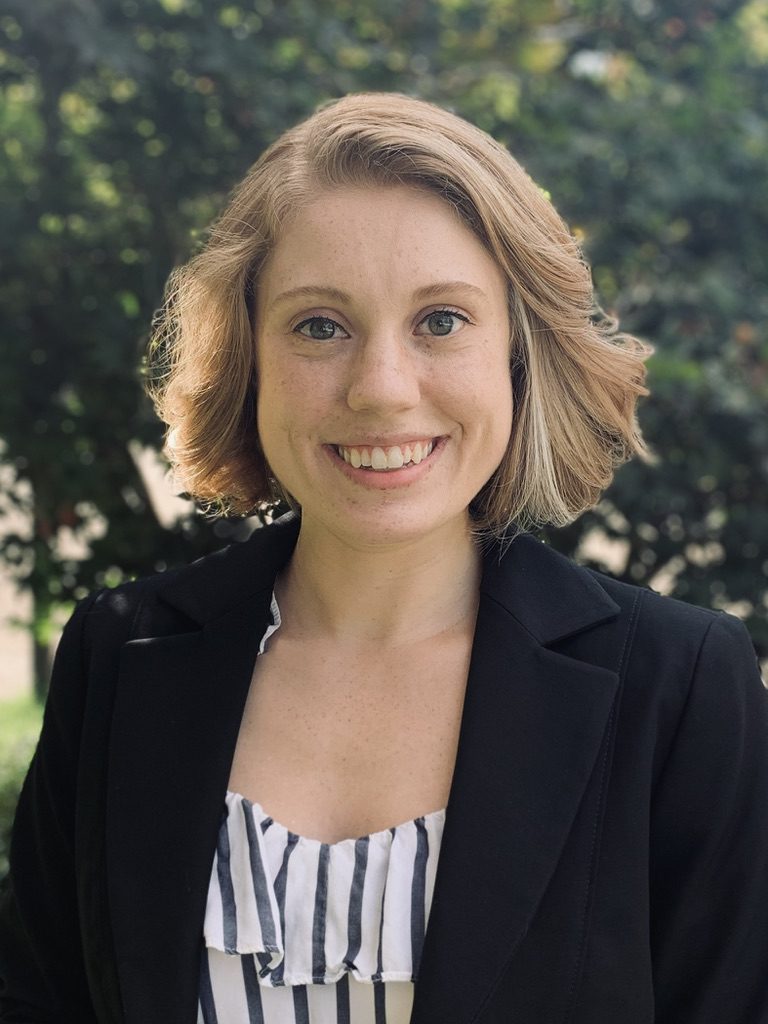
About Dr. Natalie Ricciutti
Dr. Natalie Ricciutti is an Assistant Professor in the Department of Counseling at UNC Charlotte. She received her Ph.D. from Kent State University and is a Licensed Professional Clinical Counselor and Clinical Addiction Specialist. Dr. Ricciutti’s clinical, research, and teaching expertise are in addictions counseling and education. She is an advocate for providing counseling students with the necessary information and education about substance use disorders, process/behavioral disorders, and the treatment of both using Motivational Interviewing (MI). Dr. Ricciutti has been practicing using MI for years, and teaches an MI-focused addiction intervention course. Dr. Ricciutti also researches the impact of stigma in treatment of addictions and readiness to decrease substance use across communities.
Crisis Response Planning for Suicide Risk Management: A Workshop for Health Professionals
Date: April 15, 2026
Time: 9:00 AM – 12:00 PM
Location: Zoom
Cost: $45
Credits: 3 CE
Crisis response planning (CRP) promotes collaboration by engaging individuals as active partners in decision-making, helping reduce distress and maintain a sense of control while guiding appropriate use of crisis services. This training will strengthen participants’ understanding of CRP for managing acute suicide risk and builds confidence in delivering this intervention. Didactic instruction on suicide, the development of CRP, and its research-based effectiveness will be provided. The workshop will include instructor-led demonstrations and hands-on practice to ensure participants develop and demonstrate competency in applying CRP.
Target Audience: Mental and behavioral health professionals and trainees who would benefit from foundational suicide prevention skills including counselors, social workers, psychologists, nurses, psychiatrists, and other healthcare professionals
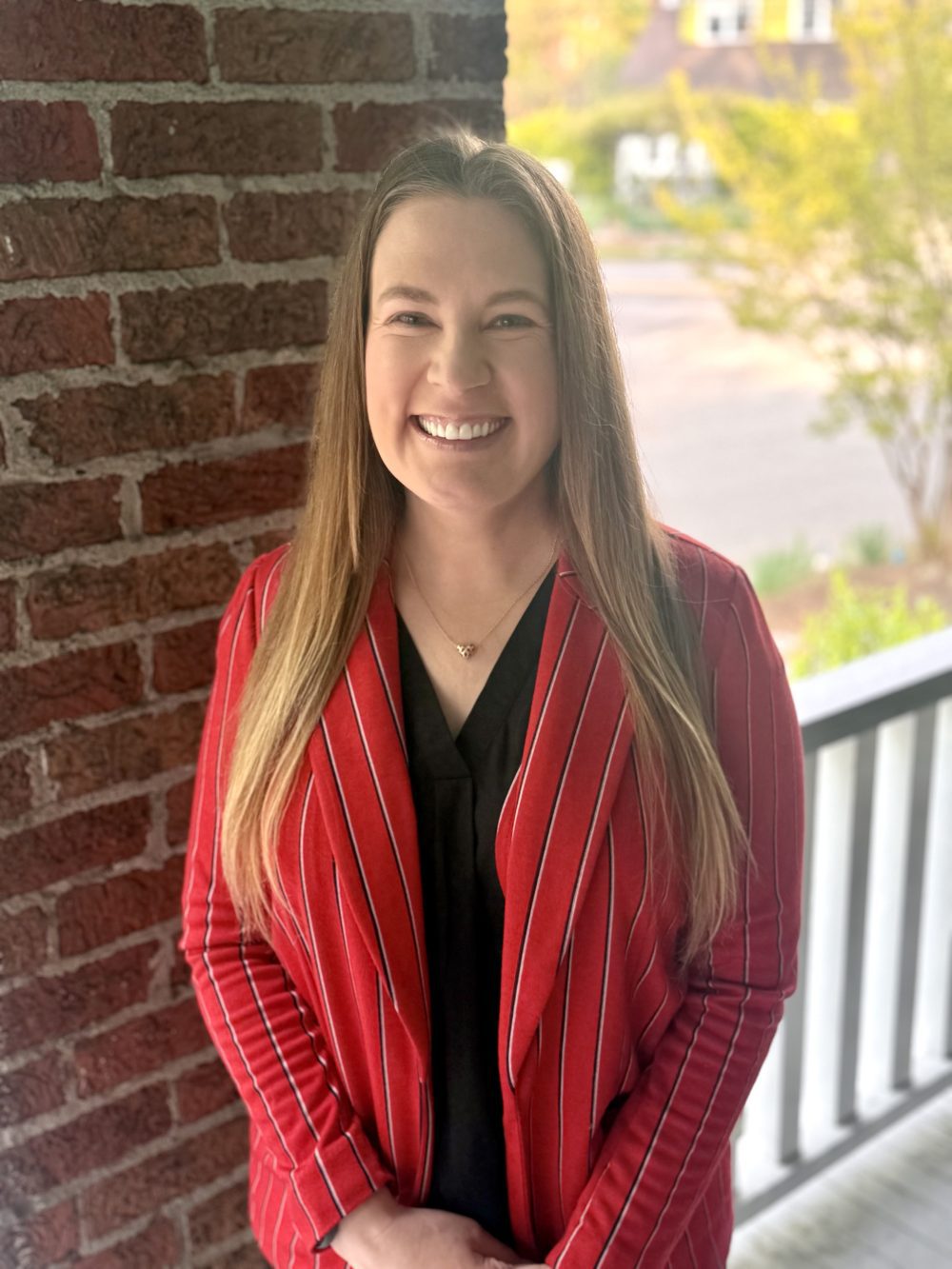
About Heather L. Rikli
Heather L. Rikli, MSW, LCSW is a current employee of UNCC and a 2014 Graduate of the University’s Master of Social Work program. She is currently stationed at Naval Medical Center Portsmouth as a Clinical Therapist and Researcher for Project GRRIT (Group Risk Reduction Intervention Therapy). This is a research partnership between UNCC, Ohio State, and the Department of Defense. In this role she delivers group therapy interventions in Brief Cognitive Behavioral Therapy (BCBT) and Dialectical Behavior Therapy (DBT) with active-duty military members. Ms. Rikli is also a private practice owner and has experience working with individuals in a variety of settings including psychiatric hospitals, emergency rooms, and correctional settings.
Collaborative Trainings
MCH Crucial Conversation Series: A Community-Engaged Approach to Supporting Justice Involved Youth
The UNC Charlotte Violence Prevention Center is proud to collaborate with the Charlotte MCH Workgroup to present the following Crucial Conversation.
Date: February 27, 2026
Time: 12:00 PM – 1:00 PM
Cost: Free
Location: Zoom
There has been increased attention to youth crime and violence in Charlotte. Communities and researchers continue to explore opportunities to intervene in ways that minimize the punitive nature of the carceral system while supporting youth potential and fostering positive developmental trajectories. Further, these approaches consider contextual issues related to the school-to-prison and abuse-to-prison pathways. The presentation will examine the factors underlying youth involvement in crime and crime desistance from a life-course perspective. Dr. Alexander will discuss findings from a project to develop a collaborative family engagement toolkit to address the needs of justice-involved youth and families from a multisystemic approach.
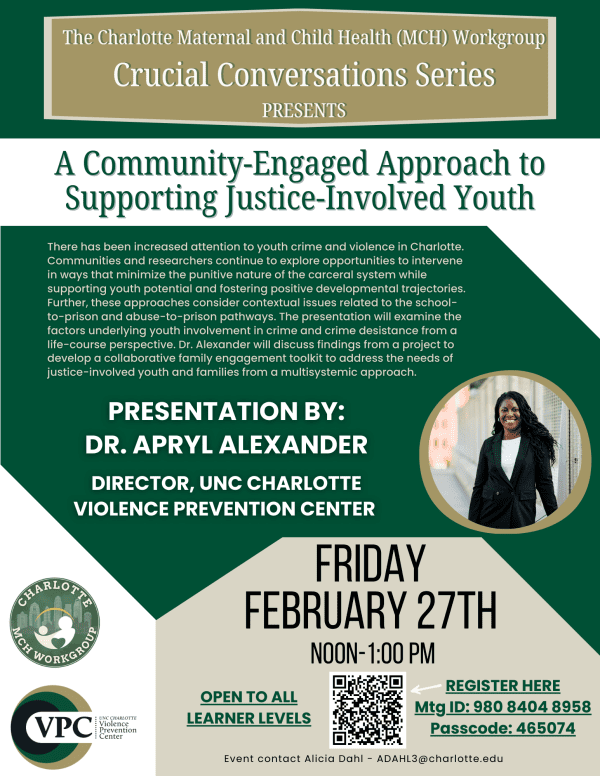
PAST TRAININGS
Our past sessions have covered a variety of essential topics and have engaged participants from diverse fields. Highlights include:
